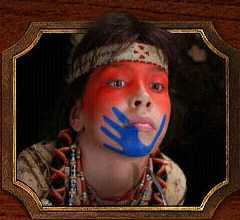 Before we get to the analysis, let's look at the source material. Below are the most significant passages in J.M. Barrie's Peter Pan featuring Indians.
Before we get to the analysis, let's look at the source material. Below are the most significant passages in J.M. Barrie's Peter Pan featuring Indians.
 Before we get to the analysis, let's look at the source material. Below are the most significant passages in J.M. Barrie's Peter Pan featuring Indians.
Before we get to the analysis, let's look at the source material. Below are the most significant passages in J.M. Barrie's Peter Pan featuring Indians.
I don't want to say Tiger Lily and the Indians in Peter Pan are stereotypical, but Barrie characterizes them as naked savages and "redskins." Also observe how people have portrayed Tiger Lily over the years in the accompanying images.
The Indians in Peter Pan
The Adventures of Peter Pan
J. M. Barrie
Chapter 5 -- The Island Come True
On the trail of the pirates, stealing noiselessly down the war-path, which is not visible to inexperienced eyes, come the redskins, every one of them with his eyes peeled. They carry tomahawks and knives, and their naked bodies gleam with paint and oil. Strung around them are scalps, of boys as well as of pirates, for these are the Piccaninny tribe, and not to be confused with the softer-hearted Delawares or the Hurons. In the van, on all fours, is Great Big Little Panther, a brave of so many scalps that in his present position they somewhat impede his progress. Bringing up the rear, the place of greatest danger, comes Tiger Lily, proudly erect, a princess in her own right. She is the most beautiful of dusky Dianas [Diana = goddess of the woods] and the belle of the Piccaninnies, coquettish [flirting], cold and amorous [loving] by turns; there is not a brave who would not have the wayward thing to wife, but she staves off the altar with a hatchet. Observe how they pass over fallen twigs without making the slightest noise. The only sound to be heard is their somewhat heavy breathing. The fact is that they are all a little fat just now after the heavy gorging, but in time they will work this off. For the moment, however, it constitutes their chief danger.
The redskins disappear as they have come like shadows, and soon their place is taken by the beasts, a great and motley procession: lions, tigers, bears, and the innumerable smaller savage things that flee from them, for every kind of beast, and, more particularly, all the man-eaters, live cheek by jowl on the favoured island. Their tongues are hanging out, they are hungry to-night.
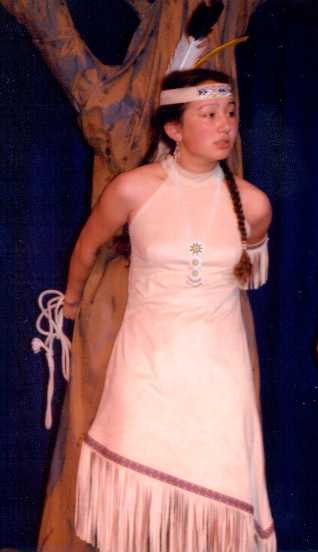
The Adventures of Peter Pan
J. M. Barrie
Chapter 8 -- The Mermaids' Lagoon
The boat drew nearer. It was the pirate dinghy, with three figures in her, Smee and Starkey, and the third a captive, no other than Tiger Lily. Her hands and ankles were tied, and she knew what was to be her fate. She was to be left on the rock to perish, an end to one of her race more terrible than death by fire or torture, for is it not written in the book of the tribe that there is no path through water to the happy hunting-ground? Yet her face was impassive; she was the daughter of a chief, she must die as a chief's daughter, it is enough.
They had caught her boarding the pirate ship with a knife in her mouth. No watch was kept on the ship, it being Hook's boast that the wind of his name guarded the ship for a mile around. Now her fate would help to guard it also. One more wail would go the round in that wind by night.
In the gloom that they brought with them the two pirates did not see the rock till they crashed into it.
"Luff, you lubber," cried an Irish voice that was Smee's; "here's the rock. Now, then, what we have to do is to hoist the redskin on to it and leave her here to drown."
It was the work of one brutal moment to land the beautiful girl on the rock; she was too proud to offer a vain resistance.
Quite near the rock, but out of sight, two heads were bobbing up and down, Peter's and Wendy's. Wendy was crying, for it was the first tragedy she had seen. Peter had seen many tragedies, but he had forgotten them all. He was less sorry than Wendy for Tiger Lily: it was two against one that angered him, and he meant to save her. An easy way would have been to wait until the pirates had gone, but he was never one to choose the easy way.
There was almost nothing he could not do, and he now imitated the voice of Hook.
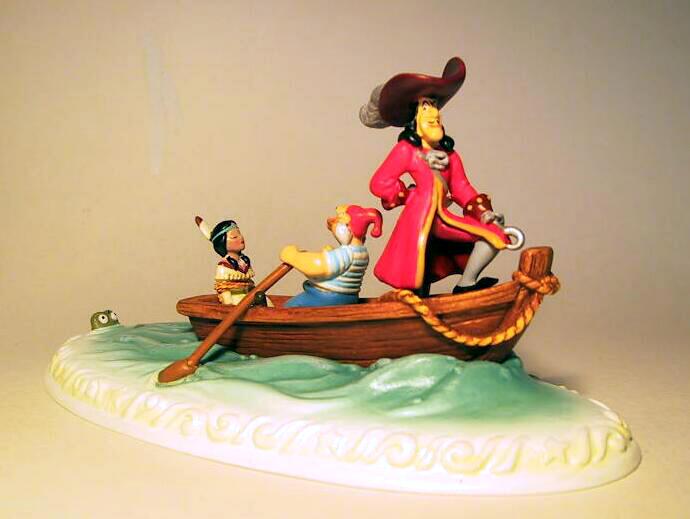
"Ahoy there, you lubbers!" he called. It was a marvellous imitation.
"The captain!" said the pirates, staring at each other in surprise.
"He must be swimming out to us," Starkey said, when they had looked for him in vain.
"We are putting the redskin on the rock," Smee called out.
"Set her free," came the astonishing answer.
"Free!"
"Yes, cut her bonds and let her go."
"But, captain — "
"At once, d'ye hear," cried Peter, "or I'll plunge my hook in you."
"This is queer!" Smee gasped.
"Better do what the captain orders," said Starkey nervously.
"Ay, ay." Smee said, and he cut Tiger Lily's cords. At once like an eel she slid between Starkey's legs into the water.
The Adventures of Peter Pan
J. M. Barrie
Chapter 10 -- The Happy Home
One important result of the brush [with the pirates] on the lagoon was that it made the redskins their friends. Peter had saved Tiger Lily from a dreadful fate, and now there was nothing she and her braves would not do for him. All night they sat above, keeping watch over the home under the ground and awaiting the big attack by the pirates which obviously could not be much longer delayed. Even by day they hung about, smoking the pipe of peace, and looking almost as if they wanted tit-bits to eat.
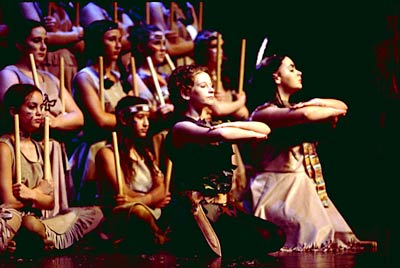
They called Peter the Great White Father, prostrating themselves [lying down] before him; and he liked this tremendously, so that it was not really good for him.
"The great white father," he would say to them in a very lordly manner, as they grovelled at his feet, "is glad to see the Piccaninny warriors protecting his wigwam from the pirates."
"Me Tiger Lily," that lovely creature would reply. "Peter Pan save me, me his velly nice friend. Me no let pirates hurt him."
She was far too pretty to cringe in this way, but Peter thought it his due, and he would answer condescendingly, "It is good. Peter Pan has spoken."
Always when he said, "Peter Pan has spoken," it meant that they must now shut up, and they accepted it humbly in that spirit; but they were by no means so respectful to the other boys, whom they looked upon as just ordinary braves. They said "How-do?" to them, and things like that; and what annoyed the boys was that Peter seemed to think this all right.
Secretly Wendy sympathised with them a little, but she was far too loyal a housewife to listen to any complaints against father. "Father knows best," she always said, whatever her private opinion must be. Her private opinion was that the redskins should not call her a squaw.

"Peter, what is it?"
"I was just thinking," he said, a little scared. "It is only make-believe, isn't it, that I am their father?"
"Oh yes," Wendy said primly [formally and properly].
"You see," he continued apologetically, "it would make me seem so old to be their real father."
"But they are ours, Peter, yours and mine."
"But not really, Wendy?" he asked anxiously.
"Not if you don't wish it," she replied; and she distinctly heard his sigh of relief. "Peter," she asked, trying to speak firmly, "what are your exact feelings to [about] me?"
"Those of a devoted son, Wendy."
"I thought so," she said, and went and sat by herself at the extreme end of the room.
"You are so queer," he said, frankly puzzled, "and Tiger Lily is just the same. There is something she wants to be to me, but she says it is not my mother."
"No, indeed, it is not," Wendy replied with frightful emphasis. Now we know why she was prejudiced against the redskins.
"Then what is it?"
"It isn't for a lady to tell."
The Adventures of Peter Pan
J. M. Barrie
Chapter 12 -- The Children Are Carried Off
The pirate attack had been a complete surprise: a sure proof that the unscrupulous Hook had conducted it improperly, for to surprise redskins fairly is beyond the wit of the white man.
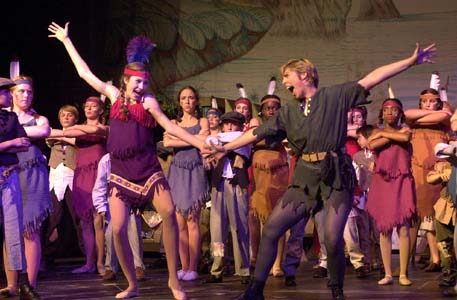
By all the unwritten laws of savage warfare it is always the redskin who attacks, and with the wiliness of his race he does it just before the dawn, at which time he knows the courage of the whites to be at its lowest ebb. The white men have in the meantime made a rude stockade on the summit of yonder undulating ground, at the foot of which a stream runs, for it is destruction to be too far from water. There they await the onslaught, the inexperienced ones clutching their revolvers and treading on twigs, but the old hands sleeping tranquilly until just before the dawn. Through the long black night the savage scouts wriggle, snake-like, among the grass without stirring a blade. The brushwood closes behind them, as silently as sand into which a mole has dived. Not a sound is to be heard, save when they give vent to a wonderful imitation of the lonely call of the coyote. The cry is answered by other braves; and some of them do it even better than the coyotes, who are not very good at it. So the chill hours wear on, and the long suspense is horribly trying to the paleface who has to live through it for the first time; but to the trained hand those ghastly calls and still ghastlier silences are but an intimation of how the night is marching.
That this was the usual procedure was so well known to Hook that in disregarding it he cannot be excused on the plea of ignorance.
The Piccaninnies, on their part, trusted implicitly to his honour, and their whole action of the night stands out in marked contrast to his. They left nothing undone that was consistent with the reputation of their tribe. With that alertness of the senses which is at once the marvel and despair of civilised peoples, they knew that the pirates were on the island from the moment one of them trod on a dry stick; and in an incredibly short space of time the coyote cries began. Every foot of ground between the spot where Hook had landed his forces and the home under the trees was stealthily examined by braves wearing their mocassins with the heels in front. They found only one hillock with a stream at its base, so that Hook had no choice; here he must establish himself and wait for just before the dawn. Everything being thus mapped out with almost diabolical cunning, the main body of the redskins folded their blankets around them, and in the phlegmatic manner that is to them, the pearl of manhood squatted above the children's home, awaiting the cold moment when they should deal pale death.
Here dreaming, though wide-awake, of the exquisite tortures to which they were to put him at break of day, those confiding savages were found by the treacherous Hook. From the accounts afterwards supplied by such of the scouts as escaped the carnage, he does not seem even to have paused at the rising ground, though it is certain that in that grey light he must have seen it: no thought of waiting to be attacked appears from first to last to have visited his subtle mind; he would not even hold off till the night was nearly spent; on he pounded with no policy but to fall to [get into combat]. What could the bewildered scouts do, masters as they were of every war-like artifice save this one, but trot helplessly after him, exposing themselves fatally to view, while they gave pathetic utterance to the coyote cry.

Around the brave Tiger Lily were a dozen of her stoutest warriors, and they suddenly saw the perfidious pirates bearing down upon them. Fell from their eyes then the film through which they had looked at victory. No more would they torture at the stake. For them the happy hunting-grounds was now. They knew it; but as their father's sons they acquitted themselves. Even then they had time to gather in a phalanx [dense formation] that would have been hard to break had they risen quickly, but this they were forbidden to do by the traditions of their race. It is written that the noble savage must never express surprise in the presence of the white. Thus terrible as the sudden appearance of the pirates must have been to them, they remained stationary for a moment, not a muscle moving; as if the foe had come by invitation. Then, indeed, the tradition gallantly upheld, they seized their weapons, and the air was torn with the war-cry; but it was now too late.
It is no part of ours to describe what was a massacre rather than a fight. Thus perished many of the flower of the Piccaninny tribe. Not all unavenged did they die, for with Lean Wolf fell Alf Mason, to disturb the Spanish Main no more, and among others who bit the dust were Geo. Scourie, Chas. Turley, and the Alsatian Foggerty. Turley fell to the tomahawk of the terrible Panther, who ultimately cut a way through the pirates with Tiger Lily and a small remnant of the tribe.
Rob's analysis
pickaninny (noun) -1. (offensive) a Black child
Synonyms: piccaninny, picaninny
AnsMe.com Dictionary
With a new movie released in December and the DVD coming out soon, Peter Pan is in the public eye again. Perhaps he's never left the public eye. Between the J.M. Barrie book, amateur and professional plays, and live-action and animated movies, the ageless man-child has long been part of our collective consciousness.
Most people know the story features Indians as supporting characters. What they don't know is that Peter Pan can be read as an allegory on Anglo-Indian relations. The book, at least, is full of events and attitudes with real-world counterparts.
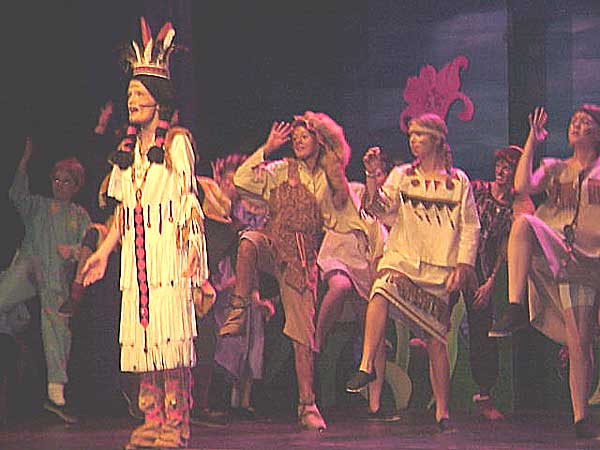
For those who don't remember the story, or who skipped the passages above, let's review the role of Tiger Lily and the Indians in Peter Pan:
In Barrie's view, the Indians are naked, murderous savages. To emphasize how subhuman they are, he names them the Piccaninny tribe, implying they're no better than troublesome black children. They're so subhuman that they consort with deadly predators—lions and tigers and and bears—who follow them in a procession. The biggest "brave," Panther, walks on all fours like an ape.
The other denizens of Neverland are pirates, an extinct profession of criminals known for being bloodthirsty and rapacious, and mermaids, a fictitious species of temptresses who lure men to their deaths. So a real race of people are equated with two nonexistent lines of man-killers.
Tiger Lily the untamed
As the tribe's "princess" and protector, Tiger Lily brings up the rear, "the place of greatest danger." She's "the most beautiful of dusky Dianas," a cold but "amorous" object of desire. Like all exotic women of myth, her dark and inscrutable exterior hides a hot, passionate interior.
She's deft with a hatchet, but not so deft that the pirates can't capture her easily. They lay her on a rock, like a sacrificial virgin. She can't escape on her own and accepts her fate stoically. But Peter Pan feels duty bound to help the helpless Indian. Though he doesn't particularly care for her, he tricks the pirates into freeing her.
Her rescue is enough to transform her from a harsh, remote Diana into a soft, loving Barbie—the preferred condition for Indian maidens. She offers herself to Peter Pan, who now calls himself "the great white father." Under his rule, the Indians must keep quiet, act humble, and prostitute themselves for the white man's pleasure.
Tiger Lily has become the perfect sex object: a formerly independent spirit who now gives herself willingly. Her name mirrors the transition. She was an animal, dark and wild as a tiger, on the outside. But she's really a flower, white and tame as a lily, on the inside.
Finally, the pirates attack. The honorable Indians expect fair play, but Captain Hook outwits them. They're too set in their ways, too brutish and unthinking, to understand modern warfare. The pseudo-English pirates massacre them, sending them to the "happy hunting grounds." Even in this fantasy-land, the white men push the Indians to extinction.
To sum it up:
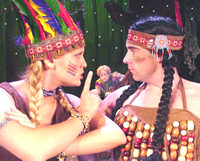
In Neverland, the pirates (read: Anglo-Americans) and Indians (read: Indians) are at war for control of the island. The perception is that Native men are savages to be conquered and killed, and Native women are savages to be enslaved and exploited.
Peter Pan, the great white father, civilizes Tiger Lily, the scalp-collecting redskin. But after forcing the Indians to submit, he abandons his post. Left to their own devices, they can't adapt to the white man's ways. Ultimately an unscrupulous army puts them to the sword, killing most and scattering the rest.
There you have it: the white man's version of Indian history encapsulated in Peter Pan.
How to fix Peter Pan
In the 2003 live-action movie, Tiger Lily and the Indians are inconsequential. She watches as John and Michael get caught in snares, presumably hers. She laughs at them.
The pirates capture all three. Hook asks Tiger Lily a question. She responds angrily in what the DVD calls "Iroquois."
Hook ties them to a rock to die. Peter Pan frees them by imitating Hook's voice. They flee to Tiger Lily's tribe of generic Indians.
An elder woman performs a healing ceremony on Michael's teddy bear. A chief in a feather bonnet looks on. The Indians dance among their teepees uttering war whoops.
And that's it. They and Tiger Lily aren't seen again. They've done little or nothing to advance the story. The pirates could've set the snares, and Peter Pan or a Lost Boy or a fairy could heal the teddy bear with magic.
That the movie reduces the Indians' role to nothing proves how irrelevant they are to the story. So perhaps future producers of Peter Pan should eliminate them. The story works just as well without them—and you don't have to reconcile a mishmash of stereotypes. (Haida actress plays Iroquois-speaking princess who belongs to a faux-Plains tribe in a Disneyesque fantasyland of mermaids and pirates.)
If producers want to be "true" to the source material and keep the Indians, here's another idea. Change them into an unnamed band of racially unspecified "savages." They could even be half-animals—e.g., cat people or werewolves. If they have to be modeled on someone, make them an extinct race—e.g., Neanderthals, Atlanteans, or Huns.
In short, use your imagination. The story doesn't require the "savages" to be Indians. If you perform this work without updating it, you're perpetuating its negative stereotypes.
More pictures of Tiger Lily and the Indians
Haida's Carsen Gray as Tiger Lily
Tiger Lily toy
School play: Tiger Lily and Indians #1
School play: Tiger Lily and Indians #2
Kids prepare to be Tiger Lily and Indians
Peter Pan in the Stereotype of the Month contest
Peter Pan's Indians heal headless teddy bear in ceremony
Video store defends Peter Pan's red-skinned savages
More on Peter Pan
Peter Pan: "Voy a matar Indios"
Teaching about Peter Pan
No harm in Peter Pan?
Still stereotypical in Neverland
Related links
Indian women as sex objects
Savage Indians
Red·skin n. Dated, offensive, taboo
|
. . . |

|
All material © copyright its original owners, except where noted.
Original text and pictures © copyright 2007 by Robert Schmidt.
Copyrighted material is posted under the Fair Use provision of the Copyright Act,
which allows copying for nonprofit educational uses including criticism and commentary.
Comments sent to the publisher become the property of Blue Corn Comics
and may be used in other postings without permission.